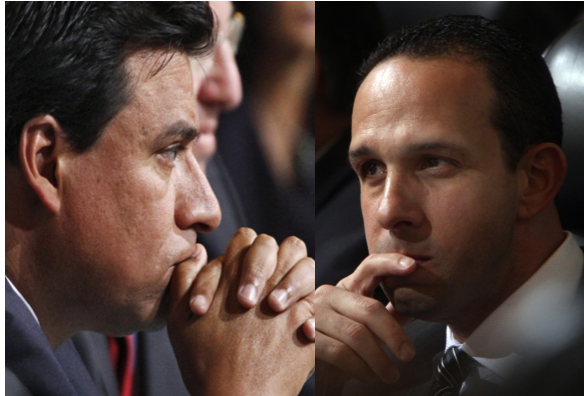CommentsVOICES--The biblical verse, "the love of money is the root of all evil," is aptly invoked in reference to the City of Angels these days.
The FBI indictments and ongoing investigations into corruption at L.A. City Hall, Councilman Jose Huizar being the latest to fall from grace, center around electeds and money—bribes, kickbacks, development projects, and political donations. (Photo above: Former LA City Council members Jose Huizar and Mitchell Englander)
Sadly, this is not surprising given that political corruption and campaign finance are inextricably linked. Politicians constantly court wealthy campaign donors to secure office. At the same time, moneyed special interests seek to curry favor with those politicians through large campaign contributions in return for policies, approvals, and/or lucrative connections at city hall. However, when campaign-palm-greasing is limited, as it is in L.A., some moneyed interests will resort to breaking the law, as appears to be the case with Councilmembers Englander and Huizar and associates.
As disturbing as the recent indictments are, there may be a silver lining; L.A.'s campaign finance laws appear to be working. Bear with me for a moment.
Los Angeles has campaign donor limits, a hybrid public finance system with strict oversight, and bans on political giving from lobbyists, city contractors, and developers. Without these reforms, the bribery and kickbacks alleged in the FBI's ongoing investigation into corruption at L.A. City Hall could have and likely would have occurred legally and brazenly via campaign contributions. To be sure, Huizar and associates still engaged in an alleged criminal enterprise, but these bad actors may not have gotten caught if L.A.’s campaign finance laws had not drawn and enforced distinct redlines. They will now pay a high price for their illicit influence peddling.
That said, LA’s campaign finance laws can and should be improved. Campaign finance is a constant game of cat and mouse; once good laws are instituted, bad actors immediately set out to find legal and illegal ways to game them. Of course, it doesn’t help when gaping loopholes in existing laws are not plugged or when loopholes are baked into new laws. Councilman Ryu’s developer ban that was passed last year was rightfully criticized for its watered down nature, and both the City and State are responsible for a willful lack of “true source” transparency, or the disclosure of human identities behind campaign contributions from entities like corporations, nonprofits, and LLCs.
The good news for reform advocates is that L.A. is not starting from scratch but building upon a strong foundation of campaign finance laws. In addition, L.A.’s Ethics Commission has presented the Council with a sound package of reforms that would greatly constrain legal bribery and influence peddling under the City’s current campaign finance system—should the City Council ever choose to implement them. Some of the Ethic’s Commission’s proposed reforms include restrictions on fundraising and bundling from people with business before City Hall; a ban on behested payments, or at least a lowering of the behested payment disclosure threshold; and a ban on contributions from developers that is at least as strong as the City’s ban on campaign donations from city contractors.
There are also a number of battle-tested campaign reforms that City Hall could implement such as a full public campaign finance system like that in Arizona or the voucher system in Seattle. There is San Diego-style “people only” campaign finance reform that prohibits entities from contributing to political campaigns. Short of a full “people only” system, L.A. could emulate San Francisco and ban business entities from donating to local politicians.[1] L.A. might consider banning political contributions from foreign-influenced corporations like Seattle has done. Finally, L.A. could require that campaign donations from non-humans (corporations, LLCs, nonprofits, etc.) disclose the human source(s) behind the donation.[2] Believe it or not, simple transparency is a powerful anti-corruption tool.[3] Some moneyed interests will cease giving lavishly to politicians if they cannot hide their identities from the public.
To be sure, none of these reforms can prevent unlimited independent PAC spending until Citizens United v. FEC is overturned, but they certainly raise the stakes on independent spenders by exposing them. The cited reforms can also decrease the undue influence big spenders have on politicians by granting candidates alternative means to raise money for a viable campaign. This is all good news.
The bad news is that political will in L.A. can be a formidable obstacle to fruition of anti-corruption reform — yes, L.A.’s City Council may still lack the political courage to enact meaningful reforms even amidst the City’s greatest corruption scandal since the 1930s when everything appeared to be for sale under Mayor Frank Shaw.
The electorate acted in 1938 by recalling Shaw. City Council President Nury Martinez has removed Huizar from the City Council because he is likely going to jail. However, it remains to be seen if the City Council will implement meaningful reforms to prevent future and/or ongoing corruption. Now is perhaps a once in a generation opportunity for City Hall to do so. Reluctant, but otherwise reform minded councilmembers, now have the political cover they need to implement sweeping anti-corruption reform. Let us hope the City Council does not miss this fleeting opportunity.
(Sean McMorris is a policy and organizing consultant for California Common Cause, and I am the founder and chapter leader of the Reprent.Us Los Angeles-San Gabriel Valley chapter. I have a B.A. in political science from Columbia University and an M.A. in international affairs from The George Washington University.)
-cw

















